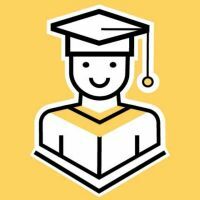Для студентов МФПУ «Синергия» по предмету Иностранный язык в профессиональной деятельностиИностранный язык в профессиональной деятельностиИностранный язык в профессиональной деятельности
5,00524
2025-08-292025-09-26СтудИзба
Ответы к экзамену: Иностранный язык в профессиональной деятельности
Описание
Список вопросов
… is the production of unusual and good responses to problems.
ass="fast-search-span">An individual’s consistent pattern of thought and behavior is known as a(n) ….
… processing, done in the posterior parietal lobe, near the top of the brain, deals with orientation, size, and where things are in space — either objects in space, or where the parts of a single object are in relation to each other.
Read the text and answer the question: John is in the seventh grade at school. His parents motivate him with money and gifts. For every good mark John gets money. Question: How can you explain this situation?
Read the text below and answer the question: You are a practicing psychologist who prefers to focus on the individual and emphasize the unique personal experience of human nature. You understand the need for general laws but it’s not something that you pursue in your practice. Question: What is the name of your approach?
Read the question below and select one correct answer: How do we cultivate creative thinking?
Read the question below and select one correct answer: Question: What is the essence of Torrance Tests of Creative Thinking?
Read the text below and answer the question: John has problems at school: he can’t analyze books, lectures or films, however, he absorbs all the information and has a magnificent memory. But when he should conduct experiments or make a conclusion about “pitfalls” of different works or motives of other people he gets puzzled. Question: What should John work on developing?
Read the text below and answer the question: Jurors place a lot of weight on eyewitness testimony. Imagine you are an attorney representing a defendant who is accused of robbing a convenience store. Several eyewitnesses have been called to testify against your client. Question: What would you tell the jurors about the reliability of eyewitness testimony?
Read the text below and answer the question: You and your roommate spent all of last night studying for your psychology test. You think you know the material; however, you suggest that you study again the next morning an hour prior to the test. Your roommate asks you to explain why you think this is a good idea. Question: What do you tell her?
Read the text below and answer the question: Sarah wants to be a psychologist. Her parents are against Sarah's decision. They want Sarah to study medicine. Sarah is upset and doesn't know what to do. Question: What should Sarah do?
Read the text below and answer the question: The mental status exam is a clinical assessment tool used to evaluate a person's cognitive and emotional functioning. It typically focuses on areas such as mood and affect, attention and concentration, appearance, and other mental processes. Question: Based on this information, which of the following areas would the mental status exam be unlikely to cover?
Match the terms with their definitions:
… was the first to systematically study and theorize the workings of the unconscious mind in the manner that we associate with modern psychology.
In the brain, the visual cortex processes visual information and passes it from lower to higher areas of the brain which is also called … .
Neurons absorb … (select 2 correct answers):
Match the components of creativity and their definitions:
In everyday life, generating creative ideas is a sign of creative performance and …’s purpose is to measure this idea generation. Ideation involves idea generation and attribution of value to it; thus, it can be an adequate creativity criterion.
… intelligence is characterized as acquired knowledge and the ability to retrieve it.
… is also sometimes called Emotional Stability.
Explicit (declarative) memory has two parts: semantic memory and … memory.
Fergus Craik and Endel Tulving conducted a series of experiments to find out which of the three types of encoding would give the best memory of … information.
Match English terms with their meaning in Russian:
Match the terms and their definitions:
According to the Atkinson-Shiffrin model, the three stages of memory are … memory, short-term memory, long-term memory.
Tip-of-the-tongue phenomenon is also known as ….
An exceptionally clear recollection of an important event is called ….
The three functions of memory are ….
Match the beginnings and the endings of the words:
In recent years, … psychology has emerged as an area of study seeking to identify and promote qualities that lead to greater happiness and fulfillment in our lives. These components include positive affect, optimism, and flow.
… is not a dimension of job burnout:
Safety needs are …
Physiological needs are …
… refers to the long-standing traits and patterns that propel individuals to consistently think, feel, and behave in specific ways.
An example of a ‘love and belonging’ level of Maslow’s hierarchy of needs is …
The … approach focuses on understanding individuals in their unique context.
The … approach in psychology seeks general principles and patterns applicable to groups.
Active imagination was developed by …
… is a brain-scanning method that scientists use to “decode” activity in the visual cortex to know what a person was looking at in terms of line orientation, position, and even what the object was.
… processing, done in the inferior temporal lobe, near the bottom of the brain, deals with shape, depth, color, intensity, and object recognition.
Read the text below and answer the question: Lily always needs some facts to solve a problem and doesn’t like to make things up. But her friend Ann often leans on her imagination. Question: Which of the girls has critical thinking and which has creative thinking?
In contrast, … thinking describes the ability to provide a correct or well-established answer or solution to a problem.
Creativity is often assessed as a function of one’s ability to engage in … thinking.
Ochse s theory was developed in …
Read the text below and answer the question: Brian is a very smart boy, however, he doesn’t excel at school work. He frequently retakes exams, argues with his teachers, barely manages to keep up with his group mates academically. Outside of school, though, he is a star. Everyone knows that if they need help with something, they can go to Brian and he can figure out a way to resolve their situation. Question: How would you characterize Brian?
… encompasses the ability to understand the emotions of yourself and others, show empathy, understand social relationships and cues, and regulate your own emotions and respond in culturally appropriate ways.
IQ stands for … and describes a score earned on a test designed to measure intelligence.
Fluid intelligence is characterized by ….
… intelligence is closely aligned with academic problem solving and computations.
When people are … they avert their gaze, which means they move their head down and to the side, exposing their neck.
You see these muscle movements—in the lips, around the eyes, and in the brow—when people are feeling aggressive, threatened, or frustrated. Researchers think we make this expression when we’re … because it could protect the face in a physical conflict—for example, the furrowed eyebrows could protect the eyes
… created cognitive-mediational theory.
… refers to a prolonged, less intense, affective state that does not occur in response to something we experience.
An … is a subjective state of being that we often describe as our feelings.
The model of human …, called Atkinson-Shiffrin:
… is the set of processes used to encode, store, and retrieve information over different periods of time
Name one part of the brain which is responsible for memory: …
Who first demonstrated semantic encoding?
The cognitive approach became the most important school of psychology during …
Match the two parts of each word:
What name is given to the study of many individuals where an attempt is made to compare them with others?
Psychologists focus their attention on understanding …, as well as the psychological (mental) and physical processes that underlie it.
The … approach to psychology focuses on the analysis of the internal mental mechanisms which, scientists claim, can only be accessed through observable behaviour. This view is largely supported by physiologists and behaviourists.
Read the question below and select one correct answer based on the information provided in the course: Question: Why do you think many people might be sceptical about psychology being a science?
… might prove especially helpful using individuals who have rare conditions. For instance, if one wanted to study multiple personality disorder then this approach with individuals diagnosed with multiple personality disorder would be helpful.
An undergraduate … in psychology hones critical thinking skills. These skills are useful in many different work settings.
Behaviorists studied objectively observable … partly in reaction to the psychologists of the mind who were studying things that were not directly observable.
If someone wanted to become a psychology professor at a 4-year college, then s/he would probably need a … degree in psychology.
The following degrees would be the minimum required to teach psychology courses in high school.
Rogers believed that providing genuineness, empathy, and … in the therapeutic environment for his clients was critical to their being able to deal with their problems.
Характеристики ответов (шпаргалок) к экзамену

❓ Как копировать вопросы во время теста в Синергии?
Комментарии
Нет комментариев
Стань первым, кто что-нибудь напишет!
 МФПУ «Синергия»
МФПУ «Синергия»  Maveevakaterina26
Maveevakaterina26

















